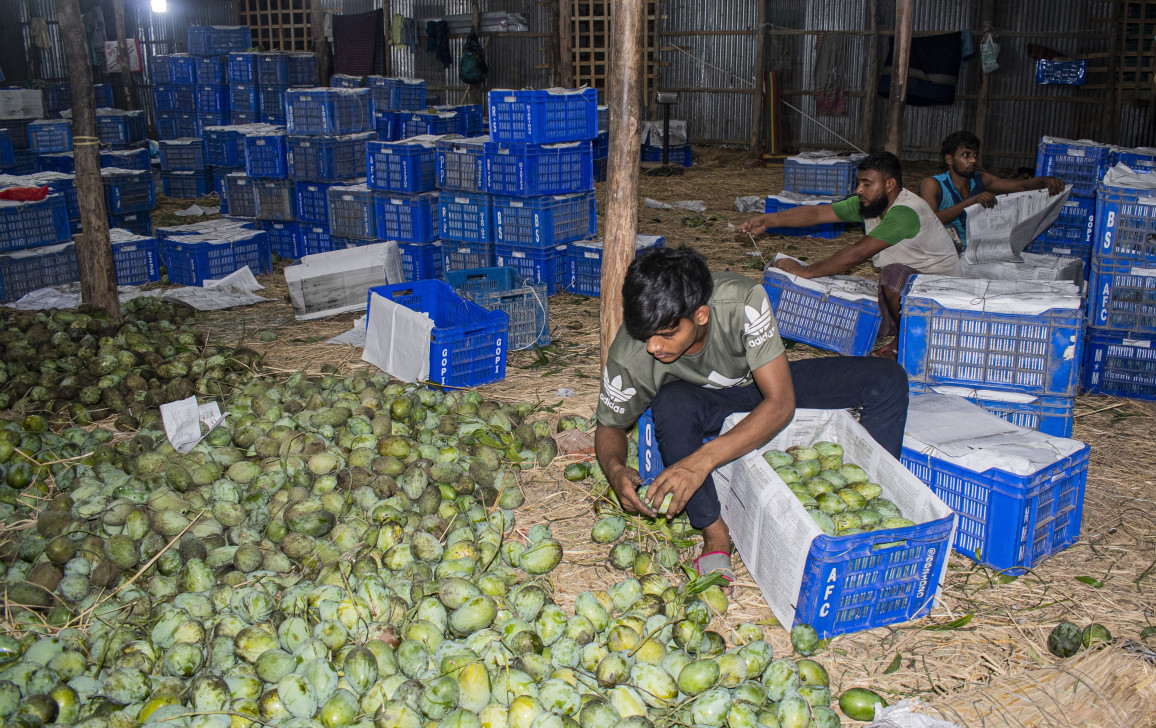The fight for safe food production in Bangladesh

As the world observes World Food Day today under the evocative theme, "Hand in Hand for Better Foods and a Better Future," its resonance echoes profoundly in Bangladesh. While the nation has undeniably achieved considerable milestones in food production since its independence in 1971, the pace of progress has not been enough. The bedrock of Bangladesh's food security faces systemic challenges, primarily stemming from a critical lack of synergy among key stakeholders.
Sustainable food security for Bangladesh requires moving beyond mere caloric sufficiency to ensure safe, non-toxic food that is environmentally sustainable. However, the production rate lags, leading to the reliance on imports of millions of tonnes of food annually. Key hurdles include the shrinking of arable land due to urbanisation, declining soil fertility from excessive agrochemical use, and significant post-harvest wastage due to poor management and inefficient market structure. Furthermore, natural disasters regularly destroy vast amounts of crops in our country.
However, producing safe food is arguably the most critical and challenging reality we are currently facing in Bangladesh. Global data further emphasises the gravity of foodborne illness. According to a report by the World Health Organization, 60 crore people fall ill and 420,000 die worldwide each year from contaminated food. The South-East Asia region, including Bangladesh, accounts for a tragic 175,000 annual fatalities for the same reason.
In Bangladesh, food contamination usually occurs at the production stage. Application of chemicals for ripening and preservation, and the indiscriminate use of chemical fertilisers, pesticides, even in processing dried fish, are widespread.
A recent seminar hosted by the Centre for Agriculture and Biosciences International (CABI) highlighted an alarming trend: pesticide use in Bangladesh has soared by 81.5 percent over the last five years, making its market worth Tk 5,000 crore. Disturbingly, 64 percent of cancer patients in the country are farmers, largely due to unsafe pesticide application practices, said the speakers at the seminar.
During a recent conversation on food nutrition and contaminated food in Bangladesh, Zakiah Rahman Moni, a nutritionist and principal scientific officer of Bangladesh Agricultural Research Council, noted from various national and international studies that 30-40 percent of marketed vegetables in Bangladesh contain high pesticide residue levels, with unacceptable amount of pesticide residues found in 10-12 percent of vegetables and 8-10 percent of fruits. Beyond pesticides, dangerous heavy metals, such as arsenic, lead, cadmium, and para-sulfur, have been detected in vegetables in some regions of the country. The ingestion of these toxic chemicals can cause us to suffer from long-term health risks, including kidney disease, neurological disorders, and cancer, the nutritionist said.
Now the main questions are: Why are farmers spending extra money to use an unhealthy amount of chemical fertiliser and pesticides? Why are heavy metals present in our daily diets? Why is the government unable to effectively ensure a market for unadulterated food?
My field-level experience as a journalist suggests that even decades after independence, Ministry of Agriculture and Department of Agricultural Extension (DAE) officials have failed to make a robust, trusting partnership with the farming community. Awareness among farmers remains critically low. When pest outbreaks occur, farmers often resort to a desperate, unguided cycle of pesticide application. The first and most trusted advisor for the majority of farmers is not the agricultural officers, but the local fertiliser and pesticide dealers. In most of the northern districts, I have seen farmers relying solely on dealers' advice, leading to the excessive and often inappropriate use of agrochemicals.
On the other hand, the physical absence of agricultural officials from the field is a common lament. Their expectation that farmers will invariably visit their office for guidance contrasts sharply with the rural reality, where farmers turn to the most accessible source of advice, mirroring how villagers consult pharmacy shopkeepers for purchasing medicines instead of going to a doctor.
Other major gaps include the neglect of soil testing, which is vital for balanced fertiliser use and soil nutrition. The lack of farmer education and training on pre-harvest intervals (PHIs), the necessary time lag to ensure a toxin-free crop harvesting, is another gap.
Finally, while the government has established the Bangladesh Safe Food Authority to combat adulteration, its operational capacity and manpower are currently inadequate to effectively monitor and regulate the country's vast and complex food market.
A matter of hope is that the government has launched a five-year (2023-2028) programme to promote safe crop production through the Good Agricultural Practice (GAP) certification scheme. This initiative aims to train approximately 10 lakh farmers and 14,000 sub-assistant agricultural officers, and bring 300,000 hectares of land under GAP standards.
GAP is a voluntary operational guideline that farmers implement to prevent contamination, ensure food safety, and promote sustainable and ethical practices in agriculture, covering aspects from land preparation to post-harvesting handling. Experts agree that Bangladesh's GAP initiative is a new beginning for safe food production, but it is a small start that is insufficient in scale and risks failing in the future without sustained policy support.
The bottom line is that to revolutionise food safety demands moving beyond conventional, toxic farming, the government needs to patronise policies to create the highest awareness in farmers, traders, and consumers, framing safe food as a matter not only for marketing but also for personal and familial health. Essential steps include re-establishing farmer-official coordination, rigorously monitoring the market, and implementing the GAP standards at the field level across the country to conquer this crisis and secure public health gains.
Mostafa Shabuj is a journalist at The Daily Star.
Views expressed in this article are the author's own.
Follow The Daily Star Opinion on Facebook for the latest opinions, commentaries and analyses by experts and professionals. To contribute your article or letter to The Daily Star Opinion, see our guidelines for submission.




 For all latest news, follow The Daily Star's Google News channel.
For all latest news, follow The Daily Star's Google News channel. 

Comments